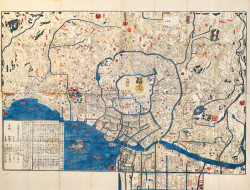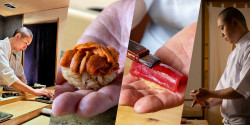
September 16, 2010
Riot Grrrl
Hard-rocking musician and political activist Doris Yeh wants fans to use their heads for thinking, not just banging
By Metropolis
Originally published on metropolis.co.jp on September 2010

Photography by Jeremy Veverka
It’s Tuesday. Make that Black Tuesday. I’m standing outside the west exit of Meguro station dodging frantic black-suited salarymen, wondering how I’m going to find a black-metal musician among the onslaught of passersby under a blackening sky. But if black is the theme of the day, then I’m in luck, because it’s not hard to pick out the stunning, black-haired rocker from the sea of locals wandering past me.
I’ve just met Doris Yeh, the bassist for Taiwanese band Chthonic who, according to Revolver magazine, is one of 2010’s Hottest Chicks in Metal. Yeh is in town to promote the Japanese release of the band’s fifth album, Mirror of Retribution, a symphonic orgy of spiritual death metal that’s also a testament to historical injustice. And to be honest, I’m just as curious about the album’s lyrical messages as I am about its music. You see, in Taiwan, Chthonic is more than a band—it’s practically a political movement.
As we make our way out of the station in the gloomy weather, Yeh describes the concept behind the dark-themed album. “Chthonic’s music is always talking about mythology and history in East Asia, and we use many elements from Taiwan’s past,” she says. For Mirror of Retribution (produced by Anthrax guitarist Rob Caggiano), the group was inspired by the so-called 2.28 Massacre, when Chiang Kai-shek slaughtered tens of thousands of Taiwanese after being routed by Mao Tse-tung’s forces on the mainland in 1947.
“There are 18 layers of hell, and after you die, you will go to the first layer,” she says. “That’s called the ‘Mirror of Retribution.’ It’s a mirror that will show you what you have done in your life.” As Yeh talks, I can’t help but wonder what Chiang saw when he looked into it.
While I wouldn’t label myself a metalhead, the band’s interest in Asian history and politics is so infectious that I can’t seem to get enough of their music—especially compared to all the banal, apathetic pop idols that are popular throughout the continent.
“We put many melodic elements into the music, so you can find a lot of different layers of guitar, strings, piano or erhu,” Yeh explains. “But although we care very much about the music, it’s also about the politics.”
Certainly, the band has made a name for itself by intertwining the two. The music is built on the foundation of drummer Dani’s blast beats and Doris’ driving riffs, with the complex melodies of guitarist Jesse, keyboardist CJ and frontman Freddy interconnecting on top. In much the same way, the band’s political message involves subtly connected layers that rest on a theme of independence, as well as a recognition of the exploitation perpetrated by the strong against the weak throughout history.
Given Chthonic’s track record of political engagement, it’s no surprise that the band supports Taiwanese independence. What’s unexpected—and refreshing—is that the members turn a similarly critical eye on their homeland. Chthonic’s previous album, Seediq Bale, focused on the exploitation of Taiwan’s aboriginal population at the hands of the Chinese, Japanese and even the Taiwanese themselves.

“The aboriginals had already lived in Taiwan for thousands of years when people came from mainland China 200-400 years ago,” Yeh explains. “There was a tribe called the Seediq, and when the Japanese army brought their war to Southeast Asia, they would get this tribe to join them [against the Chinese and Taiwanese].” Yet the exploitation didn’t end with Japan being driven from the island. “When the Chinese army came in, the Taiwanese tried to enlist the Seediq people. They said to them, ‘Now that the evil Japanese are leaving, and the more evil Chinese are coming, will you join us?’”
Recently, Chthonic has become increasingly involved in the plight of other ethnic minorities in Asia, especially the Tibetans. Yeh says that China’s loan of pandas to the Taipei Zoo last year was seen by many as just another instance of “Panda Diplomacy,” which the country has been engaged in since the 7th century. However, she sees it as a thinly veiled attempt to undermine Taiwanese independence using a cultural treasure that was originally from Tibet.
“I told Freddy that I wanted to have a campaign called ‘Pandas are from Tibet, not China,’ because historically the location where pandas are from [Sichuan] belonged to Tibet,” she explains. “Pandas are cute and we should protect them, but they also show how the Chinese government doesn’t respect a country’s culture. They can easily take cultural properties as their own, and I think that is very disrespectful.”
Yeh and her bandmates agitated against the loan of the pandas by printing up fliers and demonstrating at the zoo, where the animals were on display for several weeks. “The attraction was popular, because many people had never seen any pandas before,” she says. But visitors were in for an additional surprise: the members of Chthonic handing out their fliers while wearing panda suits festooned with Tibetan flags.
Late last year, Yeh would have a chance to meet the Dalai Lama when Chthonic and a number of other artists organized a Free Tibet concert in support of the spiritual leader’s controversial visit to Taiwan.
“We know Tibetan people suffered injustices after the Chinese army entered their country, so we all came to see the Dalai Lama to ask him how to face an enemy like that. Even after they have invaded your home, taken your property and killed your brothers and sisters, and are still threatening you—how do you face that? He said, ‘Justice shall be revealed.’”
Yeh was so inspired by these words that she wound up having them tattooed on her body in the Tibetan script. In typical rock star fashion, she got the ink job—her first—done in front of the cameras on a TV show in the US. “I had a chance to get a tattoo on LA Ink, with one of the show’s ‘tattoo warriors,’ Kat Von D,” Yeh says with a smile. “She was very gentle.”
Before Yeh ends our interview to rush off to her next appointment, she tells me that Chthonic has recently become involved in the independence movement of the Uyghur people in western China. The band’s social-media organization, Guts United, Taiwan, has picked up local rights to distribute The 10 Conditions of Love, a film about the life of exiled Uyghur dissident Rebiya Kadeer. I tell her I’m looking forward to seeing if the history of the Uyghur’s struggle makes it into their next album.
Certainly not everyone enjoys a heaping spoonful of politics with their music, and if Chthonic’s sonic thrashings strike listeners as an aural assault, then their outspoken political activism will be equally unsettling. But for those who like raging instrumentation, provocative lyrics, a dose of activism—and a gorgeous babe to boot—Chthonic is the antidote to pop-culture overdose. After all, it’s a dark world, and sometimes you need some black metal.
●Mirror of Retribution is available in Japan from Howling Bull Records (www.howling-bull.co.jp). For more information about Chthonic, see www.chthonic.tw. For more information about Guts United, Taiwan, see www.taiwanguts.com (Chinese).
●Chthonic will play heavy metal festival Loud Park on Oct 16 at Saitama Super Arena (www.loudpark.com/10).
“Loud Park 10”
Annual headbanger’s fest with Ozzy Osbourne, Korn, Motorhead and others. Oct 16-17, 11am, ¥14,000 (one day)/¥25,000 (two days). Saitama Super Arena. Tel: Creativeman 03-3462-6969.
“Ch-what?”
Chthonic, pronounced “thonic,” takes its name from the Greek word chthonios, which refers to the underworld and the spirits that live there—a meaning that’s reflected in the mythological and historical themes of the group’s music.







